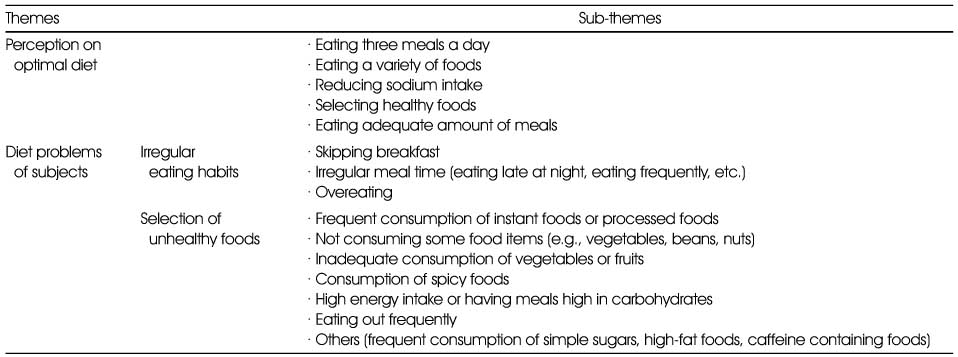References
1. Rha YA, Kang MJ, Lee SH, Kim JY. Nutrition intake according to food and exercise habits in female college students of Yang-ju si. Culin Sci Hosp Res 2015;21(4):284–293.
2. Choi KS, Shin KO, Huh SM, Chung KH. Comparison of nutritional and physical status according to the residental type among college women in Seoul women's university and Sahmyook university. Korean J Nutr 2010;43(1):86–96.
3. Lee BK, Lee JH. Evaluation of dietary variety by food habits in female university students. Korean J Food Nutr 2011;24(4):687–701.
4. Jang HB, Lee HY, Han HY, Song JH, Kim KN, Hyun TS. Changes in food and nutrient intakes of college students between 1999 and 2009. Korean J Community Nutr 2011;16(3):324–336.
5. Choi MJ, Lee YS. Nutrient intake and body composition analysis according to food habits in college females in Daegu area. J East Asian Soc Diet Life 2014;24(1):42–52.
6. Anderson ES, Winett RA, Wojcik JR. Self-regulation, selfefficacy, outcome expectations, and social support: social cognitive theory and nutrition behavior. Ann Behav Med 2007;34(3):304–312.
7. Lubans DR, Plotnikoff RC, Morgan PJ, Dewar D, Costigan S, Collins CE. Explaining dietary intake in adolescent girls from disadvantaged secondary schools. a test of social cognitive theory. Appetite 2012;58(2):517–524.
8. Mirzaei A, Ghofranipour F, Ghazanfari Z. Social cognitive predictors of breakfast consumption in primary school's male students. Glob J Health Sci 2016;8(1):124–132.
9. Ahn SH, Kim HK, Kim KM, Yoon JS, Kwon JS. Development of nutrition education program for consumers to reduce sodium intake applying the social cognitive theory: based on focus group interviews. Korean J Community Nutr 2014;19(4):342–360.
10. Krueger RA, Casey MA. Focus Groups: a practical guide for applied research 4th edth ed. Thousand Oaks, California: Sage; 2008. p. 4–19.
11. Rosenthal M. Qualitative research methods: why, when, and how to conduct interviews and focus groups in pharmacy research. Curr Pharm Teach Learn 2016;8(4):509–516.
12. Park S, Kwon JS, Kim CI, Lee YN, Kim HK. Development of nutrition education program for hypertension based on health belief model, applying focus group interview. Korean J Community Nutr 2012;17(5):623–636.
13. Kim KM. Needs assessment of nutrition education for preschoolers and their parents using focus group interview. J East Asian Soc Diet Life 2015;25(1):20–29.
14. Bandura A. Social foundation of thought and action: a social cognitive theory Englewood Cliffs, NJ: Prentice-Hall; 1986.
15. Lee SB, Jeong YR, Ahn HJ, Ahn MJ, Ryu SA, Kang NE. The development of a nutrition education program for lowincome family children by applying the social cognitive theory and health belief model. Korean J Community Nutr 2015;20(3):165–177.
16. Bengtsson M. How to plan and perform a qualitative study using content analysis. Nurs Plus Open 2016;2:8–14.
17. Korea Centers for Disease Control and Prevention. Korea National Health and Nutrition Examination Survey (KNHANES VI-2) Ministry of Health and Welfare; 2015. 12. Report No. 11-1351159-00027-10.
18. Choi KS, Shin KO, Huh SM, Chung KH. Analysis of dietary habits by MDA (mini dietary assessment) scores and physical development and blood parameters in female college students in Seoul area. J East Asian Soc Diet Life 2009;19(6):856–868.
19. Levitsky DA, Pacanowski CR. Effect of skipping breakfast on subsequent energy intake. Physiol Behav 2013;119(2):9–16.
20. Lee CR, Kim SK. Comparison of the dietary factors between normal and constipation groups by self-reported constipation in female college students. Korean J Community Nutr 2011;16(1):23–36.
21. Choi BB. Dietary habits and behaviors of college students in the northern Gyeonggi-do region. Korean J Food Nutr 2013;26(3):404–413.
22. McSpadden KE, Patrick H, Oh AY, Yaroch AL, Dwyer LA, Nebeling LC. The association between motivation and fruit and vegetable intake: the moderating role of social support. Appetite 2016;96(1):87–94.
23. Bruening M, MacLehose R, Eisenberg ME, Nanney MS, Story M, Neumark-Sztainer D. Associations between sugar-sweetened beverage consumption and fast-food restaurant frequency among adolescents and their friends. J Nutr Educ Behav 2014;46(4):277–285.
24. Hartman H, Wadsworth DP, Penny S, van Assema P, Page R. Psychosocial determinants of fruit and vegetable consumption among students in a New Zealand university. Results of focus group interviews. Appetite 2013;65(1):35–42.
25. Miller LMS, Cassady DL. The effects of nutrition knowledge on food label use. A review of the literature. Appetite 2015;92(1):207–216.
26. Rustad C, Smith C. Nutrition knowledge and associated behavior changes in a holistic, short-term nutrition education intervention with low-income women. J Nutr Educ Behav 2013;45(6):490–498.
27. Kirsch AC, Shapiro JB, Conley CS, Heinrichs G. Explaining the pathway from familial and peer social support to disordered eating: Is body dissatisfaction the link for male and female adolescents? Eat Behav 2016;22:175–181.
28. Leak TM, Benavente L, Goodell LS, Lassiter A, Jones L, Bowen S. EFNEP graduates' perspectives on social media to supplement nutrition education: focus group findings from active users. J Nutr Educ Behav 2014;46(3):203–208.
29. Sidani JE, Shensa A, Hoffman B, Hanmer J, Primack BA. The association between social media use and eating concerns among US young adults. J Acad Nutr Diet 2016;Forthcoming.
30. Kwak JE, Lee SY, Lee SH, Ko KS. A survey for needs and preference of food and nutrition information on mass media for Korean female adults. Korean J Community Nutr 2014;19(6):550–557.
31. Li Y, Wang X, Lin X, Hajli M. Seeking and sharing health information on social media: A net valence model and crosscultural comparison. Technol Forecast Soc 2016;Forthcoming.
32. Tobey LN, Manore MM. Social media and nutrition education: the food hero experience. J Nutr Educ Behav 2014;46(2):128–133.







